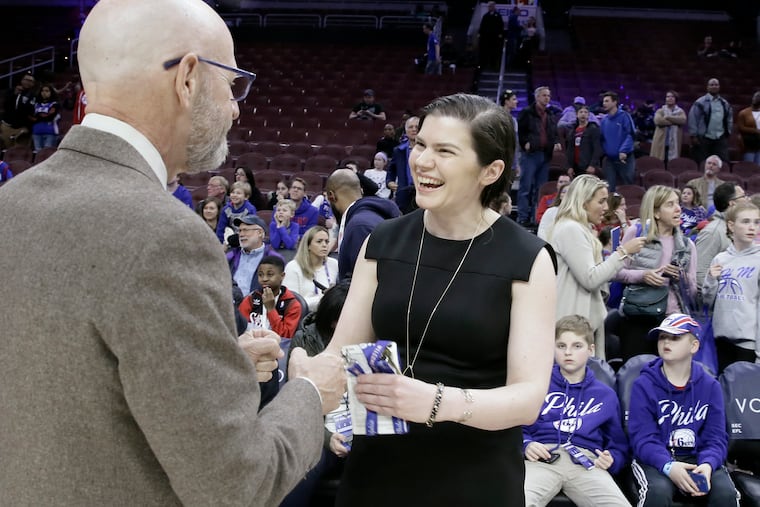VP of business operations Susan Williamson is a team player — and not just for the Sixers
She got her start as the first female manager of the Virginia men's basketball team. Now, she's the Sixers' vice president of business operations.

The Sixers are leading the way in the NBA when it comes to putting women in charge. Meet Susan Williamson, vice president of business operations, and read our other profiles here.
―
When the Virginia Cavaliers won their first national title earlier this month, Susan Williamson won it, too. She won the same way their most famous player ever, Ralph Sampson, won it; the way Sixers forward Mike Scott won it; the way Penn Charter product Sean Singletary won it. She’s been part of a Virginia team, too.
Because once you’ve invested years of your life into the daily, on-court dramatics of an athletic team, you’re a part of that team forever. Williamson invested. She was the Wahoos’ manager from 1999-2003. As a senior, she became the team’s first female head manager. She lived through bus rides and plane rides and joys and pains and sickness and, after she graduated, death.
She relived her college days during Virginia’s harrowing road to redemption, winning the title a year after becoming the first No. 1 seed to lose to a No. 16 seed. She shared the nail-biting and hand-wringing with a host of former Cavaliers players, including Roger Mason Jr., who spent 10 years in the NBA, and Travis Watson, who played in Europe.
They texted, and they phoned, and they mourned the fact that they couldn’t share it with Chris “Big Smooth” Williams, a Cavaliers teammate who died suddenly in 2017 at the age of 36.
Because that’s what teammates do.
Williamson, 38, was hired by the Sixers in 2014 as the vice president of marketing but now is the vice president of business operations, one of the highest-ranking women in the NBA and part of the team’s deep roster of women in prominent positions.
She helped the Sixers design the 76ers Fieldhouse, the home of their G-League affiliates, the Delaware Blue Coats. She helped them build their practice facility in Camden. She was the force behind the development of the sculpture garden at the facility that depicts the greatest Sixers in frozen, flowing motion.
"That’s my baby!" she said.
She might feel loyalty to the Sixers and their history, but she wasn’t wearing red, white and blue on April 8. She was Hoo’ed-up, rocking a blue-and-orange long-sleeved T-shirt.
As a manager or an executive, Williamson sets a fine example of a woman who contributes to men’s games, off the court and on. Former Duke star and WNBA veteran Lindsey Harding spent the last season as a Sixers scout, and now she’s a player development coach. Ivana Seric creates computer programs from player data that produce analytic reports that she takes to coaches’ meetings, where she helps Brett Brown formulate plans of attack and plans of defense.
Any team is much more than its players and coaches. Someone has to make sure the right number of balls are in the right places. Someone has to run the clock during drills and scrimmages. Someone has to fetch a new shoelace to replace a broken one. No team manages without managers.
Being a manager helped Williamson get her first job, selling tickets for the Knicks and Rangers. She was a marketing coordinator when Scott O’Neil arrived as president of MSG in 2008. That’s also the year Howard Jacobs took over the Knicks’ marketing department. Jacobs told Williamson he regretted he’d never earned his MBA, and, impressed by her talent and drive, he urged her to pursue hers. She left in 2012 and spent the next two years at Michigan’s Stephen M Ross School of business, but couldn’t shake her worry: Could she get back into the NBA?
It was wasted worry. O’Neil kept his eye on her. In 2014, the year after he became the Sixers’ CEO, he hired Williamson to be his VP of marketing.
“I first met Susan 11 years ago, and it was as clear then, as it is now, that she is a star,” O’Neil said. "She’s an incredible executive who always seems to grow ahead of her continued growth and promotions in the organization."
“She’s an incredible executive who always seems to grow ahead of her continued growth and promotions in the organization.”
The organization is obsessively progressive, and its women say they seldom suffer slights. Like most of the female Sixers executives, Williamson said she has encountered worse sexism from outside of sports than from within.
Consider the time she attended a mixer to meet her new classmates at business school. A half-dozen women asked her where her partner was.
“They assumed I was the wife or girlfriend of some man who’d gotten into business school,” she said. “It was just assumed that I wouldn’t be the one pursuing an advanced degree.”
That incident only strengthened her resolve: “I was, like, ‘Let’s surprise people. Let’s shock people!’”
She has often faced assumptions that she couldn’t do things men could do, which helped her even more closely identify with Tony Bennett’s Virginia team this year — a team most people assumed would collapse again. As the Cavaliers forged on, she couldn’t help but text and call her old friends. Her old teammates.
“It was virtually a reunion, reconnecting with everyone. We all have this bond, being on the same team and having this bigger purpose that we were all rooting for again, no matter how many years since some of us have talked,” Williamson said. “I mean, even now, I feel like I’m still part of that team.”